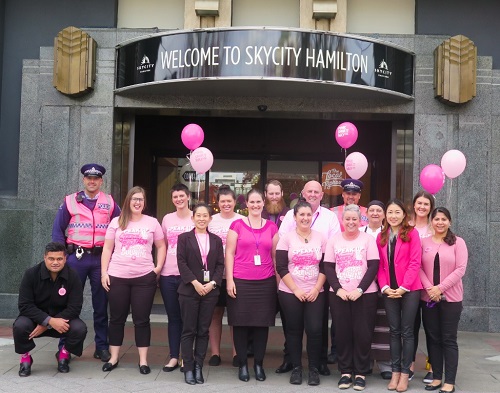HRD takes a look at the amazing ways employers across the country are celebrating Pink Shirt Day.

Workplaces across the country have taken on a distinctly pink hue today as thousands of Kiwis come together to condemn bullying and encourage colleagues to speak up.
“This Pink Shirt Day we’ve had a record number of over 1,100 registrations, including more than 300 workplaces,” revealed Shaun Robinson, CE of the Mental Health Foundation of New Zealand.
Celebrated around the world, Pink Shirt Day began ten years ago in Canada, when two teenage students decided to take a stand against homophobic bullying.
The pair – David Shepherd and Travis Price – bought dozens of pink shirts and distributed them to their male classmates after hearing about a fellow student who had been harassed for wearing pink on his first day of school.
Other students who had heard about the plan also showed up in pink to stand together against bullying. Since then, the students’ creative response has spread like wildfire and thousands of schools, clubs, and organisations have participated in their own Pink Shirt Days.
This year, entertainment giant Sky City is among the many Kiwi workplaces with activities planned. HR manager Clare Ryan said the company would be actively celebrating diversity and encouraging employees to be their unique self at work.
“It’s about saying; “Be proud to be yourself, and respect every other person’s right to do the same,” she told HRD.
The Hamilton-based HR head said that by drawing attention to Pink Shirt Day, the firm would also send a message to any potential victims that they shouldn’t suffer in silence
“It’s easy enough to say that employers don’t do enough to stop bullying, but the reality is that it can be very difficult to identify where an issue exists, particularly when the bullying behaviour is covert and the person being bullied is scared to speak up,” she told HRD.
“By embracing initiatives such as Pink Shirt Day, we’re sending a clear message that we want all of our people to feel safe and valued for who they are, without fear of harassment of any kind.”

In a photo which proves the popularity of Pink Shirt Day, two Hamilton police officers – kitted out in pink high-vis vests – pulled over to join the Sky City team and distribute pink donuts.
.jpg)
Police staff from the Rodney station in the Waitematā district are also getting involved, visiting local schools to discourage bullying in the classroom.

“Police are big supporters of Pink Shirt Day and right across New Zealand the staff celebrate it in different ways,” said Constable Bryan Ward of Rodney Police. “Speak up, stand together and let’s stop bullying together.”
Leading law firm Simpson Grierson is also among those recognising Pink Shirt Day.
“It's part of our ongoing mental health initiative to reduce stigma, increase awareness, and support a mentally healthy workplace,” said organisational development advisor Sarah Bulkeley.
“Unfortunately bullying doesn't stop at school; often in the workplace it is passive bullying which can be hard to recognise and can go unnoticed,” she told HRD. “Subtle remarks can chip away at people's self-confidence and contribute to anxiety and depression. Ultimately it is everyone's responsibility to put an end to bullying.”
As well as encouraging staff to wear pink, Bulkeley says Simpson Grierson has established a friendly competition to make the event more engaging while also driving team spirit.
“We'll be setting up a 'campaign wall' in each staff room, individuals and teams can come and take photos in front of it, we'll then be posting the pictures up on our Instagram page and tagging in #PinkShirtDayNZ because it takes a community to send the message and stop bullying,” she told HRD. “The individual and the team with the most likes by the end of the month get to take home some cool prizes.”
.jpg)
At law firm Russell McVeagh, employees in both Wellington and Auckland offices have been encouraged to wear pink while a fundraiser has also been planned.
“It has been really heartening to see our staff come to work today in pink – an outward display that our firm does not tolerate bullying in any form and sends a positive message to our staff and our clients that we embrace diversity and inclusion in our workplace,” said HR director Lesley Elvidge.
"Creating a workplace where people feel free to bring their whole selves and are able to speak out about issues that concern them is of utmost importance to us.”
.jpg)
Botting giant Coca-Cola Amatil is also getting involved with the celebrations and the firm put a strategic plan in place some weeks ago which involved company-wide reminders, a message from the firm’s managing director and a Youthline-led presentation about bullying.
“At Coca-Cola Amatil we celebrate a culture where everyone brings their whole self to work every day, and the safety and happiness of our people is simply a part of who we are,” said Heidi Somerville, senior organisational development consultant of talent and reward.
“True to one of our core values, Stand Together, we are committed to fostering a bullying-free workplace. Pink Shirt Day is the perfect opportunity to remind our people of our business wide commitment and their role in ensuring that Coca-Cola Amatil remains bullying-free.”
.jpg)
Mental Health Foundation CE Shaun Robinson praised the efforts of all involved and said workplaces with good leadership and a culture of openness and respect can prevent bullying.
“It is really important that organisations promote mental health and wellbeing; celebrate diversity, acceptance and inclusion; and, raise awareness and understanding of bullying,” he told HRD.
Sadly, workplace bullying remains a serious issue in New Zealand with up to 50 per cent of workplaces without a formal policy and 1 in 5 Kiwis likely to be victimised.
“It can have severe and ongoing impacts on a person's mental health and wellbeing and affect their capacity to do their job to the best of their ability,” he said. “We also know that bullying impacts the whole organisation, reduces productivity and increases staff turnover.”
Recent stories:








